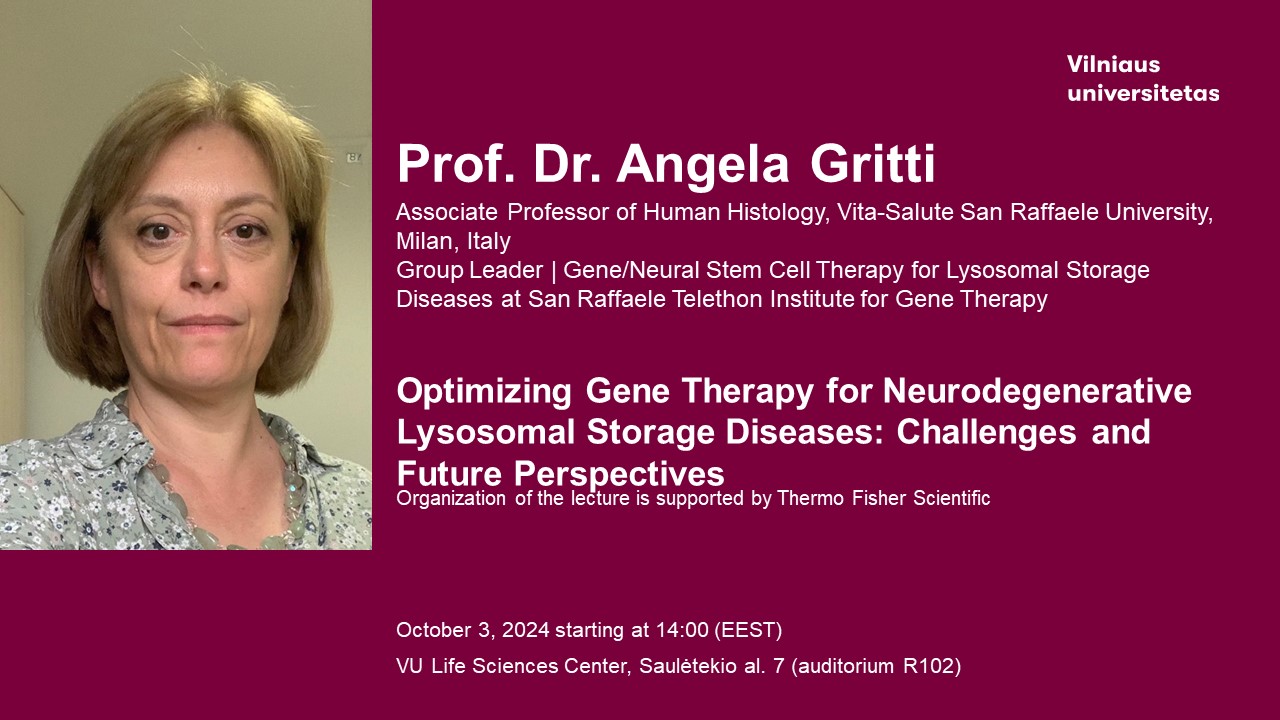 Renginio vieta: R102 a. (VU LSC, Saulėtekio al. 7, Vilnius)
Renginio vieta: R102 a. (VU LSC, Saulėtekio al. 7, Vilnius)
Pranešėja: Dr Angela Gritti yra Vita-Salute San Raffaele universiteto histologijos padalinio docentė bei LSD genų ir nervų kamieninių ląstelių terapijos grupės vadovė San Raffaele Telethon genų terapijos institute (SR-Tiget), Milane, Italijoje. Biografija
Renginio kalba: anglų
Santrauka: "Optimizing Gene Therapy for Neurodegenerative Lysosomal Storage Diseases: Challenges and Future Perspectives"
Lysosomal storage disorders (LSDs) are a group of rare inherited metabolic diseases. Genetic mutations lead to the accumulation of undigested or partially digested molecules within lysosomes, causing cell damage and a wide range of clinical symptoms that often affect multiple organ systems, including the central and peripheral nervous systems (CNS and PNS).
The clinical application of in vivo and ex vivo gene therapy (GT) for neurodegenerative and demyelinating LSDs is challenging due to difficulties in achieving and sustaining therapeutic levels of the gene product in affected tissues. The enzymatic needs can vary by tissue or organ and may change as the disease progresses, with the CNS and PNS being particularly difficult to reach and resilient to correction. Additionally, effective therapies must address the neuroinflammation characteristic of these diseases. Although LSDs share common traits, they also exhibit unique features that can influence treatment outcomes. Our previous studies have identified disease-specific variations in enzyme expression and biodistribution that affect the success of in vivo intracerebral (IC) GT and ex vivo hematopoietic stem/progenitor cell (HSPC) GT for globoid cell leukodystrophy (GLD) and GM2 gangliosidosis, both of which currently lack effective treatments.
In this presentation, I will discuss our previous and recent efforts to develop and optimize ex vivo and in vivo GT platforms for GLD and GM2 gangliosidosis by combining enzyme overexpression in effector cells with enhanced transgene bioavailability and more efficient metabolic correction of enzyme-deficient cells, particularly in the CNS and PNS.
Additionally, I will address current challenges and future therapeutic perspectives, such as new gene editing platforms, for targeting the CNS. These advancements could potentially be applied to disease modeling and the treatment of glial and neurodegenerative diseases beyond LSDs.
